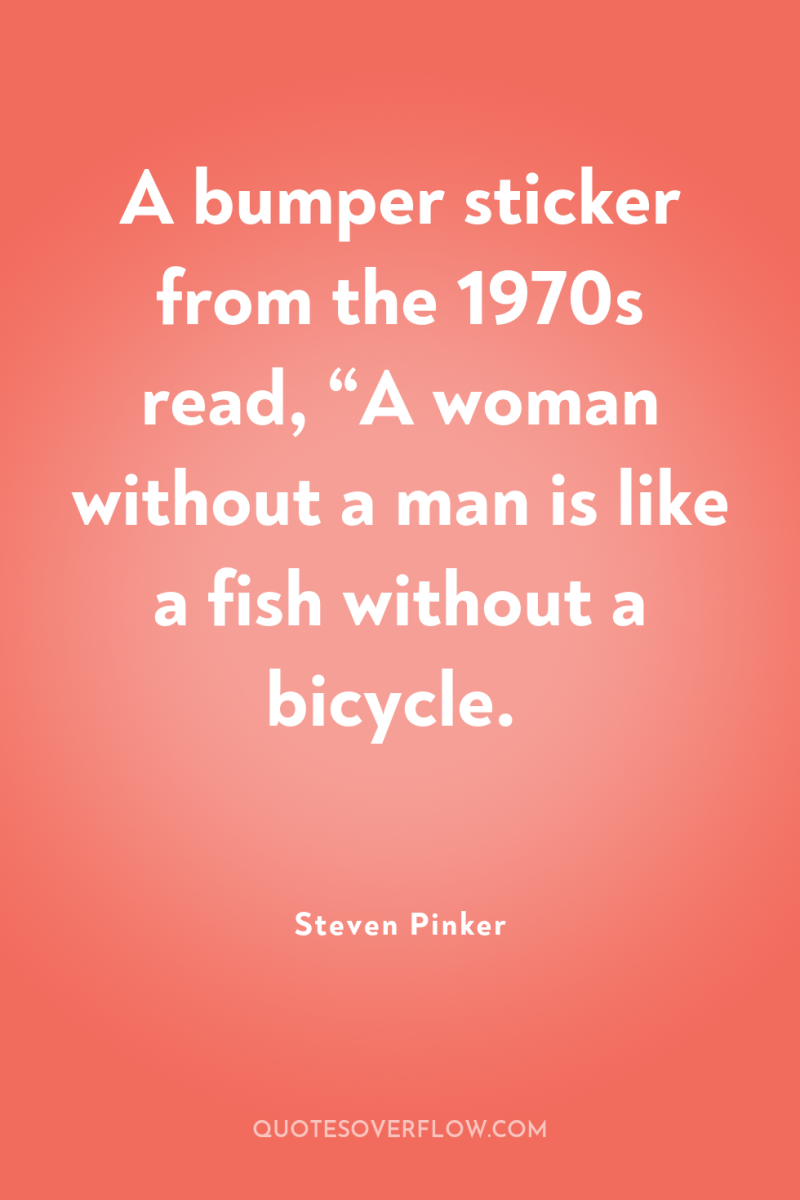1
Trivers, pursuing his theory of the emotions to its logical conclusion, notes that in a world of walking lie detectors the best strategy is to believe your own lies. You can’t leak your hidden intentions if you don’t think they are your intentions. According to his theory of self-deception, the conscious mind sometimes hides the truth from itself the better to hide it from others. But the truth is useful, so it should be registered somewhere in the mind, walled off from the parts that interact with other people. .Steven Pinker
2
Language-lovers know that there is a word for every fear. Are you afraid of wine? Then you have oenophobia. Tremulous about train travel? You suffer from siderodromophobia. Having misgivings about your mother-in-law is pentheraphobia, and being petrified of peanut butter sticking to the roof of your mouth is arachibutyrophobia. And then there’s Franklin Delano Roosevelt’s affliction, the fear of fear itself, or phobophobia.Steven Pinker

3
The mind is a neural computerSteven Pinker
4
Many textbooks point out that no animal has evolved wheels and cite the fact as an example of how evolution is often incapable of finding the optimal solution to an engineering problem. But it is not a good example at all. Even if nature could have evolved a moose on wheels, it surely would have opted not to. Wheels are good only in a world with roads and rails. They bog down in any terrain that is soft, slippery, steep, or uneven. Legs are better. Wheels have to roll along an unbroken supporting ridge, but legs can be placed on a series of separate footholds, an extreme example being a ladder. Legs can also be placed to minimize lurching and to step over obstacles. Even today, when it seems as if the world has become a parking lot, only about half of the earth's land is accessible to vehicles with wheels or tracks, but most of the earth's land is accessible to vehicles with feet: animals, the vehicles designed by natural selection.Steven Pinker
5
The task of evolutionary psychology is not to weigh in on human nature, a task better left to others. It is to add the satisfying kind of insight that only science can provide: to connect what we know about human nature with the rest of our knowledge of how the world works, and to explain the largest number of facts with the smallest number of assumptions.Steven Pinker
6
The unstated premise that nature is nice lies behind many of the objections to the Darwinian theory of human sexuality. Carefree sex is natural and good, it is assumed, so if someone claims that men want it more than women do, it would imply that men are mentally healthy and women neurotic and repressed. That conclusion is unacceptable, so the claim that men want carefree sex more than women do cannot be correct. Similarly, sexual desire is good, so if men rape for sex (rather than to express anger towards women), rape would not be as evil. Rape is evil; therefore the claim that men rape for sex cannot be correct. More generally, what people instinctively like is good, so if people like beauty, beauty would be a sign of worth. Beauty is not a sign of worth, so the claim that people like beauty cannot be correct. These kinds of arguments combine bad biology (nature is nice), bad psychology (the mind is created by society), and bad ethics (what people like is good). Feminism would lose nothing by giving them up.Steven Pinker
7
The Darwinian approach to sex is often attacked as being antifeminist, but that is just wrong. Indeed, the accusation is baffling on the face of it, especially to the many feminist women who have developed and tested the theory. The core of feminism is surely the goal of ending sexual discrimination and exploitation, an ethical and political position that is in no danger of being refuted by any foreseeable scientific theory or discovery.Steven Pinker
8
Some people think that evolutionary psychology claims to have discovered that human nature is selfish and wicked. But they are flattering the researchers and anyone who would claim to have discovered the opposite.Steven Pinker
9
Many people think that the theory of the selfish gene says that “animals try to spread their genes.” That misstates the facts and it misstates the theory. Animals, including most people, know nothing about genetics and care even less. People love their children not because they want to spread their genes (consciously or unconsciously) but because they can’t help it. That love makes them try to keep their children warm, fed, and safe. What is selfish is not the real motives of the person but the metaphorical motives of the genes that built the person. Genes “try” to spread themselves by wiring animals’ brains so the animals love their kin and try to keep warm, fed, and safe.Steven Pinker

10
I think moralistic science is bad for morals and bad for science.Steven Pinker
11
Friendship, like other kinds of altruism, is vulnerable to cheaters, and we have a special name for them: fair-weather friends. These sham friends reap the benefits of associating with a valuable person and mimic signs of warmth in an effort to become valued themselves. But when a little rain falls, they are nowhere in sight.Steven Pinker

12
A bumper sticker from the 1970s read, “A woman without a man is like a fish without a bicycle.Steven Pinker

13
The supposedly immaterial soul, we now know, can be bisected with a knife, altered by chemicals, started or stopped by electricity, and extinguished by a sharp blow or by insufficient oxygen.Steven Pinker
14
Cademics and intellectuals are culture vultures. In a gathering of today’s elite, it is perfectly acceptable to laugh that you barely passed Physics for Poets and Rocks for Jocks and have remained ignorant of science ever since, despite the obvious importance of scientific literacy to informed choices about personal health and public policy. But saying that you have never heard of James Joyce or that you tried listening to Mozart once but prefer Andrew Lloyd Webber is as shocking as blowing your nose on your sleeve or announcing that you employ children in your sweatshop, despite the obvious unimportance of your tastes in leisure-time activity to just about anything.Steven Pinker
15
Computation has finally demystified mentalistic terms. Beliefs are inscriptions in memory, desires are goal inscriptions, thinking is computation, perceptions are inscriptions triggered by sensors, trying is executing operations triggered by a goal.Steven Pinker
16
Apes have a wide variety of sexual arrangements. That means, by the way, that there is no such thing as an “ape legacy” that humans are doomed to live by.Steven Pinker
17
Even evolutionary explanations of the traditional division of labor by sex do not imply that it is unchangeable, “natural” in the sense of good, or something that should be forced on individual women or men who don’t want it.Steven Pinker
18
Thinking is computation, I claim, but that does not mean that the computer is a good metaphor for the mind. The mind is a set of modules, but the modules are not encapsulated boxes or circumscribed swatches on the surface of the brain. The organization of our mental modules comes from our genetic program, but that does not mean that there is a gene for every trait or that learning is less important than we used to think. The mind is an adaptation designed by natural selection, but that does not mean that everything we think, feel, and do is biologically adaptive. We evolved from apes, but that does not mean we have the same minds as apes. And the ultimate goal of natural selection is to propagate genes, but that does not mean that the ultimate goal of people is to propagate genes.Steven Pinker
19
Perhaps we should rejoice that people’s emotions aren’t designed for the good of the group. Often the best way to benefit one’s group is to displace, subjugate, or annihilate the group next door. Ants in a colony are closely related, and each is a paragon of unselfishness. That’s why ants are one of the few kinds of animal that wage war and take slaves. When human leaders have manipulated or coerced people into submerging their interests into the group’s, the outcomes are some of the history’s worst atrocities.Steven Pinker
20
Plato said that we are trapped inside a cave and know the world only through the shadows it casts on the wall. The skull is our cave, and mental representations are the shadows.Steven Pinker
21
A...reason we are so-so scientists is that our brains were shaped for fitness, not for truth. Sometimes truth is adaptive, but sometimes it is not.Steven Pinker
22
The mind is not designed to grasp the laws of probability, even though the laws rule the universe.Steven Pinker
23
The goal of argumentation is to make a case so forceful (note the metaphor) that skeptics are coerced into believing it–they are powerless to deny it while still claiming to be rational. In principle, it is the ideas themselves that are, as we say, compelling, but their champions are not always averse to helping the ideas along with tactics of verbal dominance, among them intimidation (“Clearly . . .”), threat (“It would be unscientific to . . .”), authority (“As Popper showed . . .”), insult (“This work lacks the necessary rigor for . . .”), and belittling (“Few people today seriously believe that . . .”). Perhaps this is why H. L. Mencken wrote that “college football would be more interesting if the faculty played instead of the students.Steven Pinker
24
The idea that boys want to sleep with their mothers strikes most men as the silliest thing they have ever heard. Obviously, it did not seem so to Freud, who wrote that as a boy he once had an erotic reaction to watching his mother dressing. But Freud had a wet-nurse, and may not have experienced the early intimacy that would have tipped off his perceptual system that Mrs. Freud was his mother. The Westermarck theory has out- Freuded Freud.Steven Pinker
25
Once we have isolated the computational and neurological correlates of access-consciousness, there is nothing left to explain. It's just irrational to insist that sentience remains unexplained after all the manifestations of sentience have been accounted for, just because the computations don't have anything sentient in them. It's like insisting that wetness remains unexplained even after all the manifestations of wetness have been accounted for, because moving molecules aren't wet.Steven Pinker
26
No society can be simultaneously fair, free, and equal. If it is fair, people who work harder can accumulate more. If it is free, people will give their wealth to their children. But then it cannot be equal, for some people will inherit wealth they did not earn.Steven Pinker
27
Some people think that evolutionary psychology claims to have discovered that human nature is selfish and wicked. But they are flattering the researchers and anyone who would claim to have discovered the opposite. No one needs a scientist to measure whether humans are prone to knavery. The question has been answered in the history books, the newspapers, the ethnographic record, and the letters to Ann Landers. But people treat it like an open question, as if someday science might discover that it's all a bad dream and we will wake up to find that it is human nature to love one another.Steven Pinker
28
We should expose whatever ends are harmful and whatever ideas are false, and not confuse the two.Steven Pinker
29
Evolutionarily speaking, there is seldom any mystery in why we seek the goals we seek – why, for example, people would rather make love with an attractive partner than get a slap on the belly with a wet fish.Steven Pinker
30
It looks as if the offspring have eyes so that they can see well (bad, teleological, backward causation), but that's an illusion. The offspring have eyes because their parents' eyes did see well (good, ordinary, forward causation).Steven Pinker
31
A design can excel at one challenge only by compromising at others.Steven Pinker
32
At first happiness might seem like just desserts for biological fitness (more accurately, the states that would have led to fitness in the environment in which we evolved). We are happier when we are healthy, well-fed, comfortable, safe, prosperous, knowledgeable, respected, non-celibate, and loved. Compared to their opposites, these objects of striving are conducive to reproduction. The function of happiness would be to mobilize the mind to seek the keys to Darwinian fitness. When we are unhappy, we work for the things that make us happy; when we are happy, we keep the status quo. The problem is, how much fitness is worth striving for? .Steven Pinker
33
Why give a robot an order to obey orders–why aren't the original orders enough? Why command a robot not to do harm–wouldn't it be easier never to command it to do harm in the first place? Does the universe contain a mysterious force pulling entities toward malevolence, so that a positronic brain must be programmed to withstand it? Do intelligent beings inevitably develop an attitude problem? (…) Now that computers really have become smarter and more powerful, the anxiety has waned. Today's ubiquitous, networked computers have an unprecedented ability to do mischief should they ever go to the bad. But the only mayhem comes from unpredictable chaos or from human malice in the form of viruses. We no longer worry about electronic serial killers or subversive silicon cabals because we are beginning to appreciate that malevolence–like vision, motor coordination, and common sense–does not come free with computation but has to be programmed in. (…) Aggression, like every other part of human behavior we take for granted, is a challenging engineering problem! .Steven Pinker
34
The stuff of life turned out to be not a quivering, glowing, wondrous gel but a contraption of tiny jigs, springs, hinges, rods, sheets, magnets, zippers, and trapdoors, assembled by a data tape whose information is copied, downloaded and scanned.Steven Pinker
35
The typical imperative from biology is not "Thou shalt... , " but "If ... then ... else.Steven Pinker